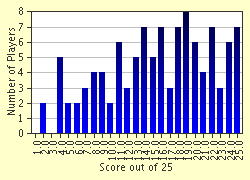Quiz Answer Key and Fun Facts
1. Although Mozart's opera is based on the sequel to Beaumarchais' "Le Barbiere du Seville", it would be nearly thirty years before "Barbiere" itself would be made into an opera.
2. How long a time period does the action of the opera take place in?
3. Beaumarchais' play was highly controversial at the time it premiered, since it attacked the prevailing class structure and questioned the privileges enjoyed by the nobility. To receive permission from the Emperor to make it into an opera, many of the more controversial passages were deleted. One of these was from a lengthy diatrabe by Figaro in Act V, bitterly attacking everything from the aristocracy to women. Which of Figaro's arias is based on a part of this speech, devoid, of course, of any political references?
4. What are Figaro and Susanna doing as the opera begins?
5. Susanna informs Figaro that the Count has gone back on his word and has no intention of abolishing the tradition of "droit du Seigneur"; he has, in fact, been making advances to her. In his aria "Se voul ballare", what imagery does Figaro use to describe how he will deal with Almaviva?
6. Susanna is accosted by Marcellina, who wants to marry Figaro herself and is venomously jealous of Susanna. They trade insults in the duet "Via resti servita". What does Susanna repeatedly refer to that infuriates Marcellina?
7. Susanna next encounters Cherubino, who is infatuated with Countess Almaviva. What belonging of hers does he steal from Susanna?
8. Cherubino hides under a dress on a chair from the Count and Don Basilio, but is discovered when the Count, displaying how he had discovered Cherubino earlier with Barbarina, lifts the dress from the chair. This delights the malicious Don Basilio, who utters a famous quote which would appear in a later Mozart opera; Which one?
9. Figaro enters with a group of servants he has assembled to give thanks to the Count in song for having promised to abolish the "droit du Seigneur". He hopes to shame the Count by doing this and, to drive his point farther home, asks the Count to do what symbolic act?
10. Learning that Cherubino will be leaving to join the Count's regiment, Figaro sings his famous aria "Non piu andrai". This aria makes an appearance in another Mozart opera; which one?
11. In both of her arias, "Porgi amor" in Act II and "Dove sono" in Act III, what does the wronged Countess Almaviva express a melancholy longing for?
12. Cherubino enters and sings for the Countess the aria "Voi che sapete", one of the best-known of Mozart's arias. He had earlier told Susanna about this song; whom did he say wrote it?
13. What is being done during Susanna's aria "Venite, inginocchiatevi"?
14. How does Cherubino escape from the Countess' room before the Count returns?
15. The Count eventually forces the door of his wife's wardrobe open with a crowbar. To the utter astonishment of both he and his wife, Susanna emerges. Later, however, Antonio the gardener (Susanna's uncle) complains that a man jumped, or fell, from the window into the garden. Figaro says that it was him, but Antonio insists that the man was smaller and shows the Count the enlistment papers that fell from the boy's pocket. It seems that the Count is about to arrive at the truth until Figaro offers an explanation as to why he was carrying the papers.
16. Antonio suffers from an "affliction" which renders his testimony less than reliable. What is it?
17. Just when everything seems resolved, Marcellina enters accompanied by Bartolo and Basilio. She announces that, according to as agreement he signed, Figaro must marry her and the marriage to Susanna cannot, therefore, take place. Why had Figaro promised to marry Marcellina?
18. In his great aria "Vedro mentr'io sospiro", the Count resolves that he will decide in favor of Marcellina and prevent Figaro and Susanna's marriage. What motive does he offer for his actions?
19. Things are going badly for Figaro in the suit with Marcellina until she and Bartolo realize that Figaro is actually their long-lost son. What was this child's (Figaro's) original name?
20. In the beautiful "Letter Duet" ("Canzonetta 'Sul' Aria'"), the Countess dictates a letter supposedly from Susanna to the Count asking him to meet her for a rendezvous in a secret location (The Countess, however, will take Susanna's place, wearing her clothing). Where, according to the letter, will this assignation take place?
21. Act IV begins with Barbarina's exquisite arietta "L'ho perduta!" ("I have lost it!"). What has she lost?
22. Marcellina sings an aria (usually omitted) in which she compares men and women to these animals.
23. Don Basilio's aria "In quegli anni" (almost invariably omitted), he describes how he escaped almost certain death at the hands of a wild beast. How did he keep the beast at bay?
24. In her great aria "Deh vieni, non tardar", what does Susanna promise to do for her beloved?
25. What principal, which is memorably embodied in the denouement of this opera (the ensemble beginning "Contessa, perdono"), can be found to some degree in all of Mozart's principal operas- "Cosi Fan Tutte", "Die Zauberflote", "Don Giovanni", "La Clemenza di Tito", and "Idomeneo"?
Source: Author
jouen58
This quiz was reviewed by FunTrivia editor
Bruyere before going online.
Any errors found in FunTrivia content are routinely corrected through our feedback system.

